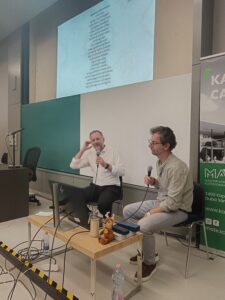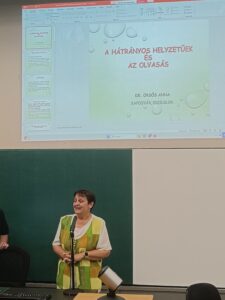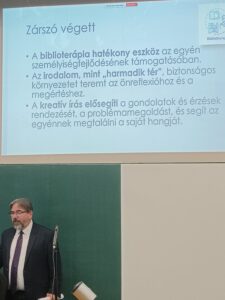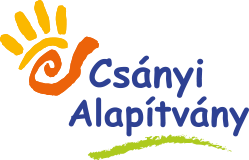
Meeting a Literary Icon
On the first Wednesday of June, we had the opportunity to attend a meaningful and thought-provoking event. A bibliotherapy conference was held at the MATE Kaposvár Campus, where one of the featured sessions was a conversation between writer Krisztián Grecsó and Dr. Péter Gombos, the university’s deputy director general.
We were all excited for the event, especially since Krisztián Grecsó is an “icon” to me—a deeply respected and beloved writer. The discussion covered his books, poetry, literature, family stories, and the fine line between reality and fiction. The therapeutic power of literature also became a central theme. As a contemporary author, Grecsó shared many personal stories and experiences, allowing us to connect with his inner world-his struggles, achievements, and life journey-which I found incredibly motivating.
“Péter bácsi,” as we fondly call Dr. Gombos, brought his usual humor to the stage. The closing part of the talk was a special game involving Grecsó’s poems. Words were swapped in his verses, and he had to find the original lines. Even though some attempts didn’t go perfectly, we laughed a lot and had a great time. I’m grateful to have met such an outstanding figure in Hungarian literature. We walked away with not only great memories but also valuable lessons and emotional insights.
Sipos Levente, Kaposvár Group 2

I had been looking forward to the bibliotherapy conference held on June 4 at the MATE Kaposvár Campus for a long time. Although the word “bibliotherapy” might sound foreign (and I must admit, I haven’t found a better term myself), the concept is quite familiar and close to the soul. Bibliotherapy means using literary texts (or any text that can inspire reflection) to spark thought, support learning, and facilitate therapeutic processes based on personal experiences.
As a drama teacher, I also view it as a powerful pedagogical tool-unique, modern, and effective. I’ve already seen its positive effects during our poetry festival with the students, and through our multi-session Parents’ Academy programs. I myself have participated in several bibliotherapy sessions and found them extremely enriching.
I was particularly excited for this conference, organized and hosted by our development teacher and MATE lecturer, Dr. Péter Gombos. The event began with greetings from Attila Nagy, a pioneer of bibliotherapy in Hungary, followed by a presentation from Éva Bakos, one of the founding members, who spoke about its development in the country.
The presenters included educators, university lecturers, librarians, and bibliotherapy group leaders. I still can’t choose which lecture impacted me the most. I was deeply moved by the presentation of Mr. Rajnai (Hungarian teacher at Munkácsy High School in Kaposvár, PhD student, and former development teacher), who has integrated bibliotherapy texts into his daily teaching. Equally inspiring was the lecture by university professor Anna Orsós, who explored the connection between Roma integration and bibliotherapy. Gabriella Szerényiné Tar, a county librarian and bibliotherapist, amazed us with her account of working with both sighted and visually impaired participants in the same group. Finally, Eszter Csorba-Simon’s presentation, “Our Unlimited Limits – The Role of Bibliotherapy in Finding Authenticity,” was a standout, showing how people from different educational backgrounds reflected on the same literary texts in a therapeutic setting.



This conference reaffirmed my commitment as a mentor and drama teacher to continue using and promoting bibliotherapy in my work. I am dedicated to showing its value in developing reading comprehension and creative writing skills-and I hope to share it with everyone involved in talent development: colleagues, children, youth, development professionals, and parents alike.
Angéla Vancsuráné Sárközi, mentor


